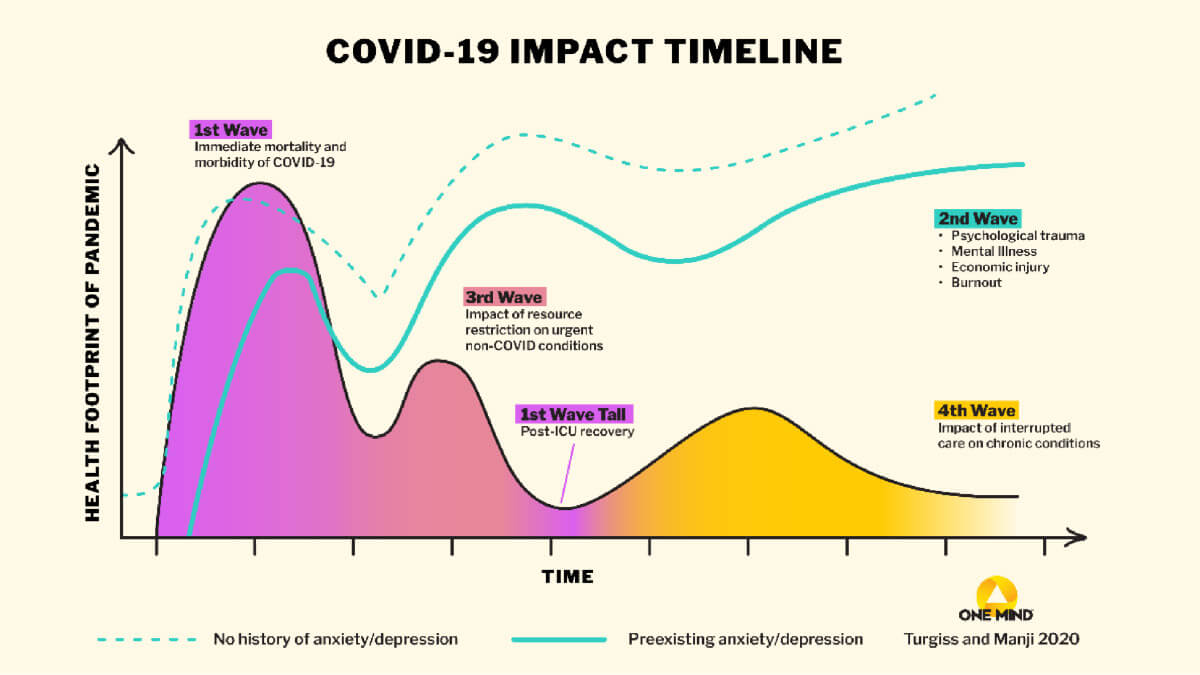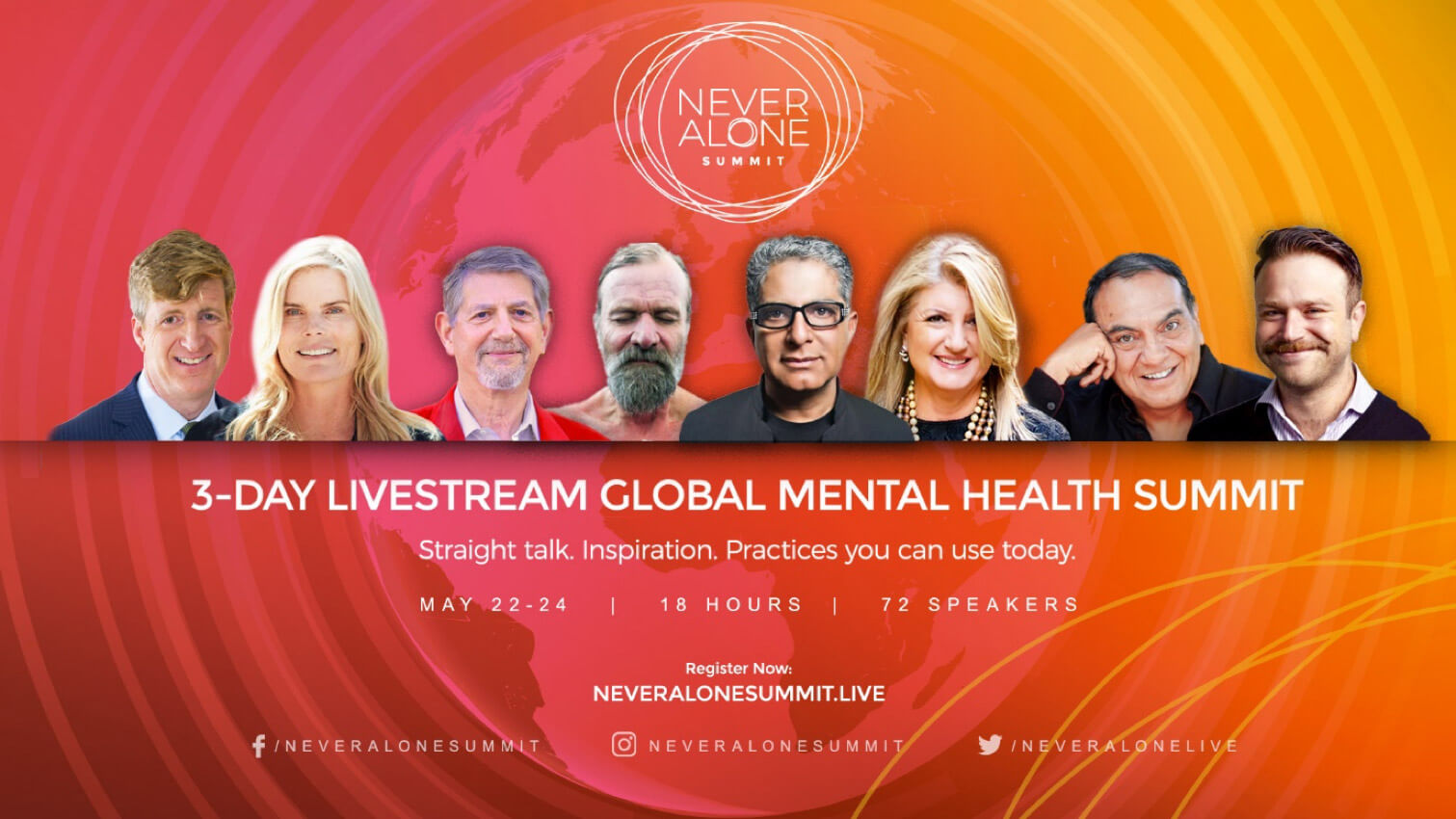By Deepak Chopra™, Cassandra Vieten, Poonacha Machaiah, and Gabriella Wright
In the face of the pandemic crisis, there is a great opportunity. It is open to everyone, and it is free. We invite you, your family, and friends to this healing experience. If you want to find your inner strength, peace, and the end of anxiety, please sign up here Never Alone Summit, a global mental health event.
In the 3-day summit you will discover the inner breakthroughs that we all need to get past the mental pain and suffering that the pandemic brings in its wake.
At this moment some people have already found a creative way to move forward. They do not feel trapped, because they welcome the chance to put their everyday life on pause. Small opportunities are all around us, to bake bread from sourdough starter, finally build that raised garden bed, meditate, walk and do yoga, and work in pajamas.
For so many others, however, it is a time of depression, uncertainty, and anxiety. Some are lonely in isolation; some feel pressure from being crowded with others for extended periods.
Between the good and bad, for most of us it’s a little bit of both, depending on the day.
There is no need to wait for symptoms of anxiety and depression. There is no reason to live with the mental discomforts of the crisis when we can share in a healing experience together. That is the purpose of the 3-Day Never Alone Summit.
Here are some key points about meeting any psychological challenge:
- You have a source of inner strength that you can directly contact.
- You can build your mental health resilience – in other words, how you withstand and adapt to the challenges that arise.
- You can find support from others who want to be part of the global healing.
- You can be of service to anyone who is isolated and needs human contact.
- You can change the tone from panic to hope, from helplessness to reassurance.
To use a metaphor, you may not be able to determine what inner obstacle course you will face, but you can become more mentally and emotionally strong, nimble, and agile.
Attending to your mental health is just as important as your physical health. In truth, the two can’t be separated. Your stress level influences everything: your immunity, inflammation, your sleep and health behaviors – all of which have a pervasive effect on your mind, body, and spirit. Taking care of your mental, emotional and spiritual health cannot be separated from protecting your physical health. They are one and the same.
If you are starting to get a little anxious, you are not alone. It is projected that overall, mental health symptoms will substantially intensify during the pandemic. Many will lose hope, lose faith, or lose someone they love. Mental health is being called the “parallel pandemic,” expected to impact more people and for a longer period of time than the COVID crisis, especially for those without a history of depression and anxiety. Check out this chart from our friends at One Mind:

This makes it crucial that we all focus just as much on building our mental, emotional, and spiritual strength as we have focused on protecting ourselves from the virus.
Building mental health resilience – whether in yourself, or in someone you love or people you work with – relies on ALL aspects of our lives. Mental health has to do with how we think and feel and how our brain works, but also with how we move our bodies, what and how we eat, the microbiome in our gut, how we sleep, how we connect with community, nature, and spirit, where we place our attention, and even how we breathe.
It may seem overwhelming, but the good news is there are hundreds of evidence-based, simple (though not always easy) and free practices in each of these areas that can be gently included over time into our lives to boost mental health resilience in a short period of time. Not to be naive, even very small lifestyle changes can be surprisingly difficult – for everyone, especially when feeling down. But behavioral science also has proven methods for gradually anchoring new practices into your life – such as linking a new behavior to one you already do (doing five minutes of stretching whenever you brush your teeth, or meditating in your car for ten minutes when you park your car for work or come home).
You can build an ecosystem that supports your mental, emotional and spiritual well-being. What’s more, most of these practices are enjoyable, rewarding, and connect you with others – helping you to remember that you are not alone. At times, they even bring joy, wonder, and magic into your life – which are not the opposite of stress, but can be antidotes to stress.
This is why we have been pouring our hearts into creating Never Alone: A Global Mental Health Summit on May 22-24, 2020. A collaboration between our respective organizations – The Chopra Foundation’s #NeverAlone initiative and the John W. Brick Mental Health Foundation – this 3-day livestream focuses on whole-person approaches to mental health. Attending this summit can help you build your own ecosystem for mental, emotional, and spiritual health.
Featuring people like Deepak Chopra™, Arianna Huffington, Mariel Hemingway, Don Miguel Ruiz, Zak Williams, Wim Hof, Rick Hanson, Shauna Shapiro, Luisah Teish, Dan Siegel, Rhonda Magee and dozens more, the over 70 talks running about 12-minutes each are designed to share ideas, inspiration, and practices you can use right away from experts, celebrities and athletes, and ordinary people with extraordinary stories. It is completely free, and will offer follow-up resources people can access post-summit. You can drop in and out whenever you like, and it will be viewable live or on-demand.
I hope you can join us there, and in the meantime, stay well.

